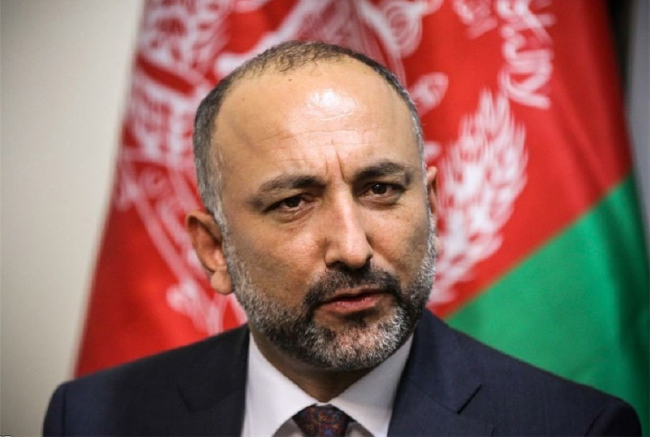Mohammad Hanif Atmar, Afghan National Security Advisor attended the eighth international high-level security meeting in the Russian region of Tver. The meeting was devoted to international information security and how to fight organized crime globally. The initiative was taken by Russia’s Security Council and high-ranking security officials from more than 30 states took part in this meeting.
The Afghan National Security Advisor’s agenda was to convince the Russian and Central Asian nations that defeating terrorist groups by individual capacity is difficult, therefore, a joint combat strategy should be developed to fight these groups across the Central Asia. Besides, he elaborated how terrorist networks try to create suspicions among countries in our region.
Afghan National Security Advisor has visited Russia several times during the last two and half years to bolster and cement state level relations with Moscow. Meanwhile, American generals such as Josef Votel and Curtis Scaparrotti separately, and some low-level Afghan security officials as well, accuse Russia helping Taliban militants in the country. But Moscow has always denied the accusations. Hence, Mr. Atmar encourages Russia to denounce relations with Taliban and run for a state level cooperation while he met his counterpart Nikolai Patrushev.
If allegations are proved right, it seems that Kremlin is on the threshold of committing a second mistake in its Afghanistan policy in last 38 years unless rethink it. First, during the cold war era while the erstwhile Soviet occupied Afghanistan in 1979. And now, by siding with the enemy of Afghan people; the Taliban. During the occupation of Afghanistan by the Soviet Union, it was faced with the Afghans’ resistance and left the country according to Geneva Accords 1988 in frustration, thus putting an end to a nine-year-long occupation of the country. By backstopping Taliban, Kremlin is walking an old road leading to a second frustration and dejection. Public antipathy and hostility are up roaring against the Taliban and other terror networks. Siding with them directly enlist Moscow as the enemy of Afghanistan.
It is an aberration and fallacious believe that supporting a terrorist group in order to get rid of the other one. Morphologically both, Taliban and Islamic State are from the same fiber and have the same contexture. For the Afghan people, the Islamic State and Taliban are both terrorist groups which threaten the stability of their country, kill and torture them, destroy their country’s infrastructures and challenge the sovereignty of their legitimate state. Besides, Afghan National Defense and Security Forces are sacrificing in an excruciating war against Taliban and the Islamic State including twenty other terrorist networks that have similar nature and mindset and function under the umbrella of extremism in the country. Instead, Russian should benefit from their relations with Taliban and bring them on negotiation table with the Afghan government to end the protracted war in the country, as it is much better for the interests of both Kabul and Moscow.
Notwithstanding, Zamir Kabulov, head of the Russian foreign ministry's department responsible for Afghanistan and the Kremlin's special envoy in the country has punctually emphasized that Kremlin's contact with Taliban is for exchanging information with the group and see shared interest with them when it comes to fighting the so-called Islamic State. And at the same time, Taliban acknowledged the authentication of reports and maintained that Russia supports the group "politically and morally", but providing political and moral support, leave aside the military support as it is widely claimed inside Afghanistan, to a terrorist group is neither for the interest of Russia nor the region. Instead, as it is an African proverb which says only the owner can free his house from mice, so the Russian government should envisage a state to state cooperation to address the contemporary and mutual challenges whether it is Islamic State, drug or instability in Afghanistan.
The menace of terror and their destructive mindset will not be bond to a particular geography, suppose Afghanistan. It is epidemic and spreads beyond boarders. As a Taliban militant, standing on the main intersection of Kunduz city in the Northeast of the country flattering the white flag of the group during the brief capture of the city in 2015 cried in front of a smartphone camera, "Islamic Emirate of Afghanistan will prevail and dominate all Central Asian countries and the whole world one day, if God's willing." Therefore, it requires joint efforts to contain terrorism.
Now, it is upon the officials in Kremlin to understand the long-term vision of Taliban. One with knowledge of the Taliban's ideology and background will not refuse to confess that the group has a plan beyond the boundaries of Afghanistan. The cornerstone of their rebellion is to establish a worldwide Emirate that is why they sheltered Osama bin Laden, his companions and Al-Qaida's training camps in Afghanistan during their rule in the country from 1994 to 2001. On the other hand, the mindset and civil code of the Taliban are the same as Daesh with a difference in the name. They both behead out-groups, deny fundamental rights of women and minorities and believe in a radical reform of the society.
Afghanistan understands that the presence of Russian-speaking fighters in the Islamic State in Syria and Iraq can expand as a potential destructive network in Central Asia which is considered as Russia’s backyard. Thus, it is for both Kabul and Moscow to get to a common understanding to fight the menace in mutual terms.
Home » Opinion » Why Russia Should Rethink its Afghanistan Policy?
Why Russia Should Rethink its Afghanistan Policy?
| Nassir Ahmad Taraki

